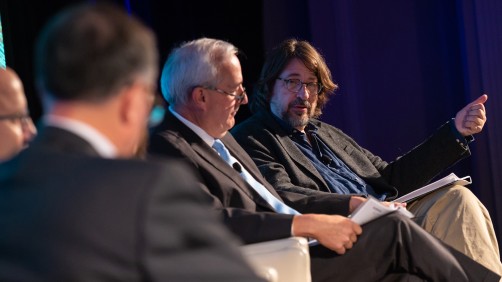
New ACM Fellow Rick Stevens at right.
Rick Stevens has been named a Fellow of the Association of Computer Machinery (ACM). Stevens is associate laboratory director of the Computing, Environment and Life Sciences directorate at the U.S. Department of Energy’s (DOE) Argonne National Laboratory and a professor of computer science at the University of Chicago.
Stevens was honored “for outstanding contributions in high-performance computing, collaborative environments, and tools for large-scale science initiatives.”
“I am honored to be named to this distinguished group at ACM,” Stevens said. “I continue to be fascinated by the challenges and opportunities raised by extreme-scale computing and how innovative techniques such as deep learning can accelerate our ability to solve critical scientific problems and benefit our society.”
Stevens has a long track record of anticipating the next class of computer architecture and envisioning how researchers can harness that capability for new scientific discoveries. He was chief architect for the National Computational Science Alliance, which delivered terascale computing to researchers; an ardent promoter of petaflops software, architecture and applications; and founding director of the National Science Foundation TeraGrid project.
At Argonne, Stevens served as manager of the Advanced Computing Research Facility, one of the first experimental laboratories for parallel computing; and he created the Argonne Leadership Computing Facility, one of two DOE Office of Science leadership computing user facilities.
Stevens now is working on next-level computing enterprises: exascale and artificial intelligence. For example, he is leading Argonne’s AI for Science initiative and a significant collaboration with Intel and Cray to launch Argonne’s first exascale computer, Aurora, an effort that received Crain’s Chicago Business’ Fast 50 2020 award. He also is the principal investigator of a scalable deep neural network application called the CANcer Distributed Learning Environment, or CANDLE.
In 2017, he and his team received the HPCwire Editors’ Choice Award for “Best use of AI” and the DOE Secretary’s Appreciation Award for bringing advanced computing and machine learning to cancer studies.
ACM is an educational and scientific computing society, and ACM Fellows represent less than one percent of the association’s global membership. This year, 95 Fellows were selected for their accomplishments in computing and information technology, as well as service to ACM and the larger computing community.



